THE KEY TO RACIAL HARMONY
The recent riots in Sydney in December 2005 saw mobs of
Australian and Lebanese Islamic youth clash in some of the most violent
rampages ever seen in Australia. The bashing of two lifesavers at
Cronulla beach by Lebanese youths sparked the race-hate mob violence
that escalated into a battleground in several Sydney suburbs resulting
in the burning of a church, the destruction of hundreds of cars and
police patrolling the streets in record numbers. Worse, it had all the
hallmarks of spreading to other cities as anger grows at the
destruction of the Australian way of life by these "people of Middle
East appearance".
Multiculturalism:Yet the issue of why so many young Australian men and women reacted so strongly to continual loutish behaviour by groups of Lebanese troublemakers will no doubt be avoided, because it embraces the vexed subject of multiculturalism, a concept developed without respecting the rule of God, yet loved and protected by left-wing politicians and academics with unlimited support from the media. For the godless media, like many politicians, believe they have some kind of divine right to tell everyone else what is good for them. However, though multiculturalism sounds noble and fine it completely ignores the fundamental fact that worshipping many gods will never bring harmony or unity to a nation! Some years ago author John Gully put it this way: "The trendy 'New Class' version of multiculturalism being thrust upon us would reduce Australia from a solid, united sovereign nation down to a political area populated by a Babel of tribes, a kind of human menagerie, with no common loyalty, no core values, minimal intercommunication and no feeling of fellowship". Extreme? No doubt, but containing more than a grain of truth, as we shall see as time goes by. Accept Christian Standards: As the Australian way of freedom and democracy, under the Lordship of Jesus Christ, has provided true unity in diversity, surely it cannot be asking too much that people who want to come here to live and enjoy our Christian spiritual blessings, should accept our standards and ways and assimilate. For people of a Christian persuasion this is no real problem but for those of vastly different religious backgrounds it is another story. The point is that Australians are right to be alarmed and their alarm has nothing to do with racism, class or colour, but has everything to do with creed or belief. Now we have an Islamic problem of some sizeable magnitude. For over 500 years either physically or covertly Muslims have been at war with infidel unbelievers - Christians or any other non-believer in Islam. And knowing that Christian countries, such as Australia, are a soft touch, Islamic leaders now have their followers migrate here and when in sufficient numbers demand part of this 'Great Southland of the Holy Spirit' for Islam! Supporting Terrorism: What has happened in Britain, France, Germany, Denmark and many other countries is now happening here. All Islamic countries are covertly funding and supporting death and destruction through terrorism against Christian nations while publicly condemning the terrorist attacks in New York, London and Madrid. Before the latest strife in Cronulla, gangs of Muslims brutally dragged women off the street and pack-raped them with their supporters laughing on camera after the case was dealt with in court. And this is just one example of Muslim intolerance of Western women whom they often refer to as sluts and whores for wearing bikinis. One-World System: Many people are aware that plans are well in hand to set up an anti-Christian, socialist one-world system to bring the nations of planet Earth under the control of a group of elites via the auspices of the godless United Nations. < www.multiline.com.au/~johnm/submit/subchron5.htm#key > |
|
In order to accomplish this aim various means have been employed to
destroy the homogeneity of countries such as Australia, which is a
prime target for fragmentation as this land was founded and established
on the Word of God and until recently has virtually honoured one God,
God Almighty and His Son the Lord Jesus Christ since European
settlement over 200 years ago.
R.A.: Led by our Lord Jesus Christ through the power of the Holy
Spirit to glorify God with the Brotherhood of Man and in love and
faithfulness to bring glory and honour to His Holy Name. Amen.
Our weakness is that, although this nation has been richly blessed over the years, most of us do not understand why. Many give credit to our own cleverness or to the god of luck but not to the God of the Bible whose Kingdom laws for living we Australians received through our British heritage and the English Common Law. Herein lies the key to the downfall of Christian Australia. We do not understand the source of our blessings. Nor do we understand the spiritual war going on all around us between the forces of good and the seducing and deceptive spirits of evil in the spirit world. Interrelated Keys: So, what is the key to restoring racial harmony in this land of diverse cultures that are threatening to tear us apart? Actually, there are several keys, but all are interrelated. The first is for all of us, both leaders and citizens, to acknowledge that Christianity is our basic culture; that we are not a melting pot of cultures and that the melting pot is itself meant to melt. We must realise that no nation in history has survived with many gods as its source of worship. In fact, God has commanded, "You shall have no other gods but Me". Moreover, He has said, "If you ever forget the Lord your God, and go after other gods and serve them and worship them, I testify against you today that you will surely perish". It is time to stand firm against the assaults of those who would lead us away from the true God whoever they may be, whether our political masters, the media, Marxist academics or any others of the secular humanist brigade. Whoever we may be, it is time for us all to "nail God's colours to the mast, to make tomorrow sure and fast". Not Many Roads to God: Secondly, we must be fully convinced that all religions are not equal. There are not many roads to God, as we are so often told. Jesus made it perfectly clear when He said, "I am the way, the truth and the life. No one comes to the Father except through me". The Scriptures further add, "Whoever denies the Son does not have the Father either; he who acknowledges the Son has the Father also". (1 John 2:23) Neither Allah, Buddha, Confucius nor any other so-called god can save us. All these roads lead not to Life but to Death! And thirdly, if we are to live in harmony, we must pray fervently to God through Christ Jesus in the power of His Holy Spirit in us. Everyone who wants to see God bring healing to our land must heed the words of Repent Australia's motto: "If my people who are called by my name will humble themselves and pray and seek my face, and turn from their wicked ways, then I will hear from heaven and will forgive their sin and heal their land". (2 Chronicles 7:14) Therein lies the key. Will you use it? PRAYER Lord God Almighty, Spirit of the Great I AM; our Redeemer, the Holy One of Israel; how Great Thou art! There is no other God like You, loving Father. As ambassadors and kingdom warriors of the Most High God, cleansed and washed in the blood of Jesus, and fired by Your Holy Spirit, we rejoice and worship You in Spirit and in truth. Thank You, Abba Father for making known to us the End from the Beginning and that in the midst of terrorism, national unbelief, deception, spiritual ignorance and increasing chaos from ethnic conflicts, You have a great sovereign plan of redemption. Moreover, omniscient Father, we acknowledge, that Your plan cannot be thwarted because You triumphed over evil through the blood of Jesus at Calvary. At the Cross too the dividing walls between peoples were broken down to set captives free, and to release from darkness the spiritually blind as the Good News is preached to the lost to find true harmony by becoming one in Christ Jesus. Gracious Father, clothed in the full armour of God, we pull down all evil strongholds and destroy every symptom of bigotry, rebellion, pride, false gods and racial hatred and cast them under the feet of Christ Jesus. Holy Father, by Your Spirit of Counsel and Might, renew the minds of both leaders and citizens of this 'Great Southland of the Holy Spirit' to obey God's Word and look to Jesus Christ, the Author and Finisher of our faith. Also, empower Your kingdom warriors with Wisdom and Understanding to boldly preach the Gospel to those lost in materialism and apathy to demonstrate Your true new creation - on earth. By this means, we pray, fulfil Your eternal plan for Christ's coming Kingdom of Love, Truth, Righteousness, Justice, Goodness, Joy and Peace. We pray all this in the majestic name of the King of kings and Lord of lords, JESUS CHRIST, to Your glory. Amen. REJOICE & SHARE IN FAITH THIS MESSAGE IN PRAYER WITH OTHERS & BE BLESSED TO BE ONE IN CHRIST JESUS. < www.multiline.com.au/~johnm/submit/subchron5.htm#key > |


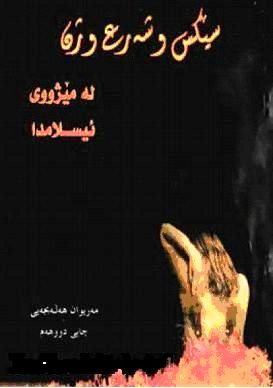
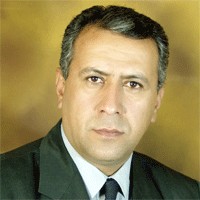
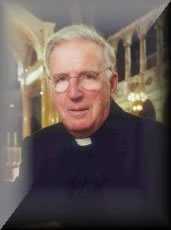 Muslims must speak up for the rights of Christians in Islamic countries
and work with Christians towards a "mutual witness" to the shared
values of peace and justice, British Cardinal Cormac Murphy-O'Connor
said in Melbourne last night.
Muslims must speak up for the rights of Christians in Islamic countries
and work with Christians towards a "mutual witness" to the shared
values of peace and justice, British Cardinal Cormac Murphy-O'Connor
said in Melbourne last night.
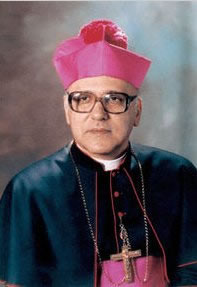 In its extreme form, the Christian Zionist program identifies the
Gospel with "the ideology of empire, colonialism and militarism" and is
"detrimental to a just peace within Palestine and Israel", says
Jerusalem bishops in a hard-hitting statement.
In its extreme form, the Christian Zionist program identifies the
Gospel with "the ideology of empire, colonialism and militarism" and is
"detrimental to a just peace within Palestine and Israel", says
Jerusalem bishops in a hard-hitting statement.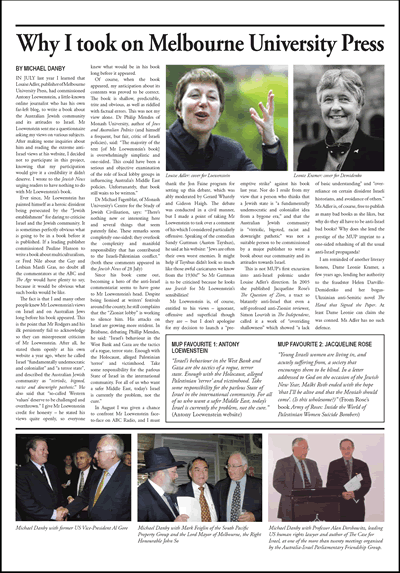
Great post, Antony.
It would be good to see Federal Labor actively distancing themselves from voices like Mr Danby’s.
Maybe you should consider sitting for election as a candidate … How about Melbourne Ports as an electorate?
Or Sydney! I’d vote for you Antony as I am sure MANY, MANY others would too!
Great Idea!
Brilliant bit, Ant.
I’m a little confused, what’s this Danby feller do for a living, aside from kitten-swiping at you? Considering he only once had to come up with the tripe he’s incessantly repeating, even that couldn’t be a full-time gig.
I saw the Danby ad in the AJN. In it, he quotes Rose, from “her book” Army of Roses . A bit of research shows that the only connection between this book and Rose is that the title has a word in it that is very close to her name. Good research, Michael! BTW, the phrase “Is this normal?” which Michael finds in the book isn’t in fact there
Mike holds a seat for the “left” in the Australian federal parliament. In his spare time he defends Israel, defames Arabs, stifles debate in the Australian parliament, and plagarizes talking points from the PNAC script:
—–
* All of Iraq’s 240 hospitals and more than 1200 clinics are open and have been re-equipped.
* Since April more than 22 million vaccination doeses have been given to Iraqi children
* For the first time in its history, Iraq has an independant judiciary, with 400 courts functioning.
* All 22 Universities and 43 technical institutes and colleges are open, as are nearly all primary and secondary schools.
* Most cities and towns now have elected governments, and the interim Iraqi authorities are now in charge of most day-to-day government.
- Michael Danby, The Australian, October 20, 2003.
——–
——–
L. Paul Bremer
Coalition Provisional Authority Administrator
Opening Remarks
Press Conference 9 October 2003
[…] Six months ago there were no functioning courts in Iraq.
* Today nearly all of Iraq's 400 courts are functioning.
* Today, for the first time in over a generation, the Iraqi judiciary is fully independent.
[…] Six months ago nearly all of Iraq's schools were closed.
* Today all 22 universities and 43 technical institutes and colleges are open, as are nearly all primary and secondary schools.
[…]
* Today all 240 hospitals and more than 1200 clinics are open. […]
* Pharmaceutical distribution has gone from essentially nothing to 700 tons in May to a current total of 12,000 tons.
* Since liberation we have administered over 22 million vaccination doses to Iraq's children.
=========
So he’s a neocon and a liar (same thing); as well as a Likudnik. The ALP hould get rid of him.
Great post Ant.
I agree with your reasoning, Antony. It is too important a battle to lose.
Despite the diaspora in the past always being on the fringes of western society- sometimes brutally treated, sometimes meanly discrininated against, sometimes grudgingly accepted and sometimes accepted but barely noticed - they have made great contributions not just in industry and commerce but in music and the arts and academia and the professions where their numbers proportionately always seem higher than their actual percentage of the community.
Mindless anti-semitism is largely confined to a few neo-nazis. Israel’s belligerent bahaviour, its apartheid-type policies and the ruthless lobbying against critics here and in the US is ultimately going to lead to outbreaks of anti-semitism. Its people and followers deserve a lot better.